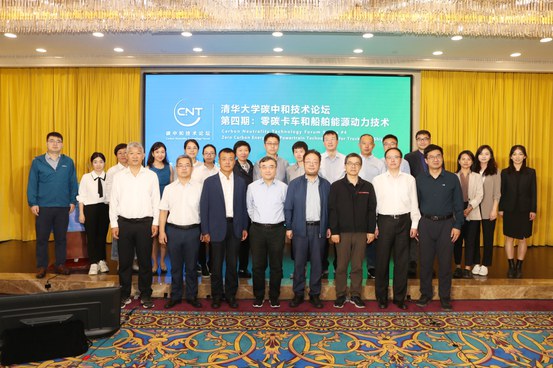Zero-Carbon Trucks and Ships Await Technology Breakthroughs
On September 30th, 2022, with the support of Energy Foundation China (EF China), Tsinghua University convened the fourth Carbon Neutrality Technology Forum to explore zero-carbon energy and powertrain technology for trucks and ships, with a focus on technical solutions for zero-carbon transportation pathways in different scenarios. Over 30 experts and scholars from the Chinese Academy of Sciences, Beijing Transport Institute, China Classification Society, and others attended the forum, along with more than 110,000 live streaming viewers.

More than 30 experts attend the forum on zero-carbon energy and powertrain technology for trucks and ships, hosted by the Tsinghua Institute for Carbon Neutrality on September 30, 2022, with support from EF China. Photo by the Institute of Carbon Neutrality, Tsinghua University
Zou Ji, CEO and President of EF China, said that the electrification of the auto industry, a key pillar of the economy, has huge potential to drive investment and consumption while also addressing energy security concerns. Over the past decade, transportation electrification has made a significant contribution to innovation for economic growth and must continue to grow in the context of China’s carbon neutrality goal, he said.
Ouyang Minggao, Academician of the Chinese Academy of Sciences and Professor at Tsinghua University, discussed zero-carbon heavy trucks and identified three technical routes: pure electric, fuel-cell, and zero-carbon hybrid power. Guo Jifu, Director of the Beijing Transport Institute, addressed the challenges of upgrading zero-emission freight transportation systems in megacities, which requires the collaboration of the industry sector, vehicle fleets, energy systems, and transportation systems. He emphasized that the necessity of building a freight system where clean energy is widely adopted in transportation scenarios. Peng Wang, Director of BYD Commercial Vehicle Research Institute, discussed the importance of commercial vehicles in the carbon emission reduction of the transportation sector, as well as their technical bottlenecks in driving range, charging speed, and battery range in cold weather. Progress needs to be made in four key areas: battery, motor and electric control, overall motor vehicle technologies, and intelligent vehicles, he said.
For the second part of the forum, the experts discussed ship powertrain technology. Cai Yan, Vice President of China Classification Society, suggested improving infrastructure and preparing a policy system to advance the adoption of methanol fuel. Yin Fei and Wu Guodong, both from China Shipbuilding Industry Group, shared the progress and possible future trends of technology for renewables-powered ships. Gao Jingzuo, from Wuhan Ship Design Institute of China Yangtze Shipping Group, discussed the challenges facing lithium battery-powered ships and provided potential solutions.
In the final session, Wang Hewu, Director of the Zero-Carbon Transportation Research Center of the Tsinghua Institute for Carbon Neutrality, gave a detailed explanation of the research background and progress of the EF China-supported project titled “Zero-Carbon Energy and Powertrain Technology Outlook for Trucks and Ships.” The research report is expected to cover the current status, future trends, and challenges of zero-carbon transportation, as well as recommendations for how to achieve carbon neutrality in the hard-to-abate sector.




